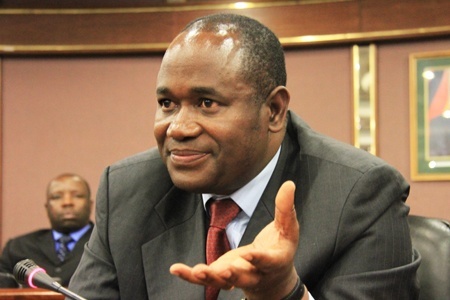
WHO would have thought that the wheels of the economy would come off after a good run in the first three years of the inclusive government? Those with supernatural powers of course!
REPORT BY NDAMU SANDU Indeed goods are plenty on the shop shelves but it’s of no use if the targeted consumer does not have money.
It was by all accounts a tough year for the workers who had to bear the brunt as companies struggled to stay afloat. Salary increments and the once proverbial 13th cheque rapidly became foreign concepts.
Cost containment became the buzzword at strategic meetings at a time the cost of living went up, effectively eroding the little money that workers had.
Even companies that had the capacity to pay bonuses joined the chorus.
Banks also thought they would reap where they had not sown by imposing extortionate bank charges. Banks’ siblings, microfinance institutions, upped the ante with high interest rates of up to 40% per month. Ironically, these were the same institutions established to help fight poverty.
The honeymoon would be brought to an abrupt end soon after government announced plans to control bank charges and interest rates to deal with the sector’s mischief-makers.
The lawlessness of yesteryear reared its ugly head after three banks shut down during the course of the year.
- Chamisa under fire over US$120K donation
- Mavhunga puts DeMbare into Chibuku quarterfinals
- Pension funds bet on Cabora Bassa oilfields
- Councils defy govt fire tender directive
Keep Reading
Interfin was placed under curatorship after the Reserve Bank of Zimbabwe [RBZ] found the institution to be unsafe and unsound.
Royal and Genesis banks surrendered their licences after failing to meet the minimum capital requirements.
The National Social Security Authority took up an 84% stake in ReNaissance Merchant Bank [now Capital Bank], a move that removed the institution from curatorship. The bank had been placed under curatorship last year after founding directors — Patterson Timba and Dunmore Kundishora — had allegedly spirited away depositors’ funds.
Afre shareholders booted out Timba from the board — alongside Norman Nyazema and Daud Dube — following recommendation from the insurance regulator, Insurance and Pensions Commission.
Kundishora had resigned from the Afre board during the course of the year.
An investment vehicle owned by Mines minister Obert Mpofu rescued ZABG from closure after agreeing to invest in the troubled bank in an assets backed transaction. The bank has turned the corner and has been renamed Allied Bank.
Mauritian banking group, AfrAsia snapped up a 35% stake in Kingdom Financial Holdings Limited, ensuring the bank met the minimum capital requirements. The group has been rebranded AfrAsia Kingdom Zimbabwe.
RBZ governor Gideon Gono announced in August that phased capital requirements for banks designed to have minimum equity capital of US$100 million by June 2014, sparking uproar from bankers who felt that the central bank boss wanted to “kill off” some institutions. The uproar was to spill into cabinet but Gono had the final say.
Banks are working to meet the first phase deadline of US$25 million by December 31.
The International Monetary Fund loosened its restrictions on technical assistance, paving the way for a Staff Monitored Programme. This came after government met the conditions required — timely reporting of data and removal of ghost workers from payroll.
Winston Churchill once said that to jaw-jaw is always better than to war-war. This message seems to have escaped Rainbow Tourism Group [RTG] shareholders as they tore each other apart.
During the course of the year, shareholders finally buried the hatchet and agreed on the appointment of a new board chaired by industrialist Joseph Kanyekanye.
The board went on to appoint Tendai Madziwanyika as CEO last month to replace Chipo Mtasa, who quit the hospitality group in March.
As companies reposition to meet the new challenges, so is the exit of chief executive officers and managing directors. Those that left among others include Washington Matsaira [Standard Chartered Bank], Sibusisiwe Ndlovu [Afre], Josphat Sachikonye [RioZim], Nyasha Makuvise [CBZ], Charles Nyambuya [Tractive Power Holdings]and Joe Mutizwa [Delta].
Mutizwa was appointed to the Starafricacorporation board to provide the skills necessary to revive the company.
Early this month, Vaka Concrete — an indigenous construction company where Mutizwa is chairman and major shareholder — unveiled its US$4 million concrete building products.
Cheers resonated in the tourism industry after two major airlines began flying into Zimbabwe, a move that helped the country become accessible to tourists.
Emirates introduced flights into Harare in February while KLM resumed flights in October after a 13-year break.
Mozambican airline LAM and Namibian flag carrier Air Namibia also resumed flights into Zimbabwe. The arrival of these airlines is a plus for the country as it readies to co-host the UNWTO general assembly in Victoria Falls next year.
In a landmark decision, the Kimberley Process Certification Scheme withdrew monitors and allowed Zimbabwe unhindered exports of the Marange diamonds, ending years of intensive lobbying by government which insisted it had met the minimum conditions required to sell the gems.
Despite the high production of diamonds, Treasury says revenue is not flowing into national coffers, forcing Finance minister Tendai Biti to cut the 2012 national budget by US$400 million.
Government launched the Industrial Development Policy in March to help accelerate the growth of industries. Industries required recapitalisation to replace obsolete equipment and provide working capital.
A recent report by the Confederation of Zimbabwe Industries shows that capacity utilisation, on the increase since the use of multiple currencies, went down to 44,2% this year from 57,2% recorded in 2011, spelling gloom for the industry.
2013 outlook In the outlook, politicking will dominate in the run-up to the watershed elections in 2013, Gono’s final term ends in November and watch out for the new money bags — the chiefs — after being given custodianship of community trusts amid reports that some are seeing the projects as part of their dynasties.











